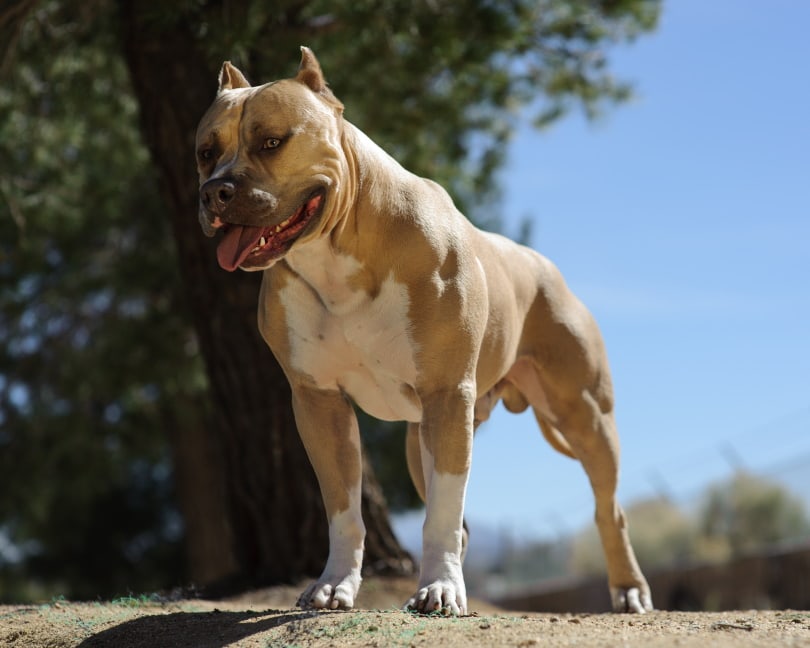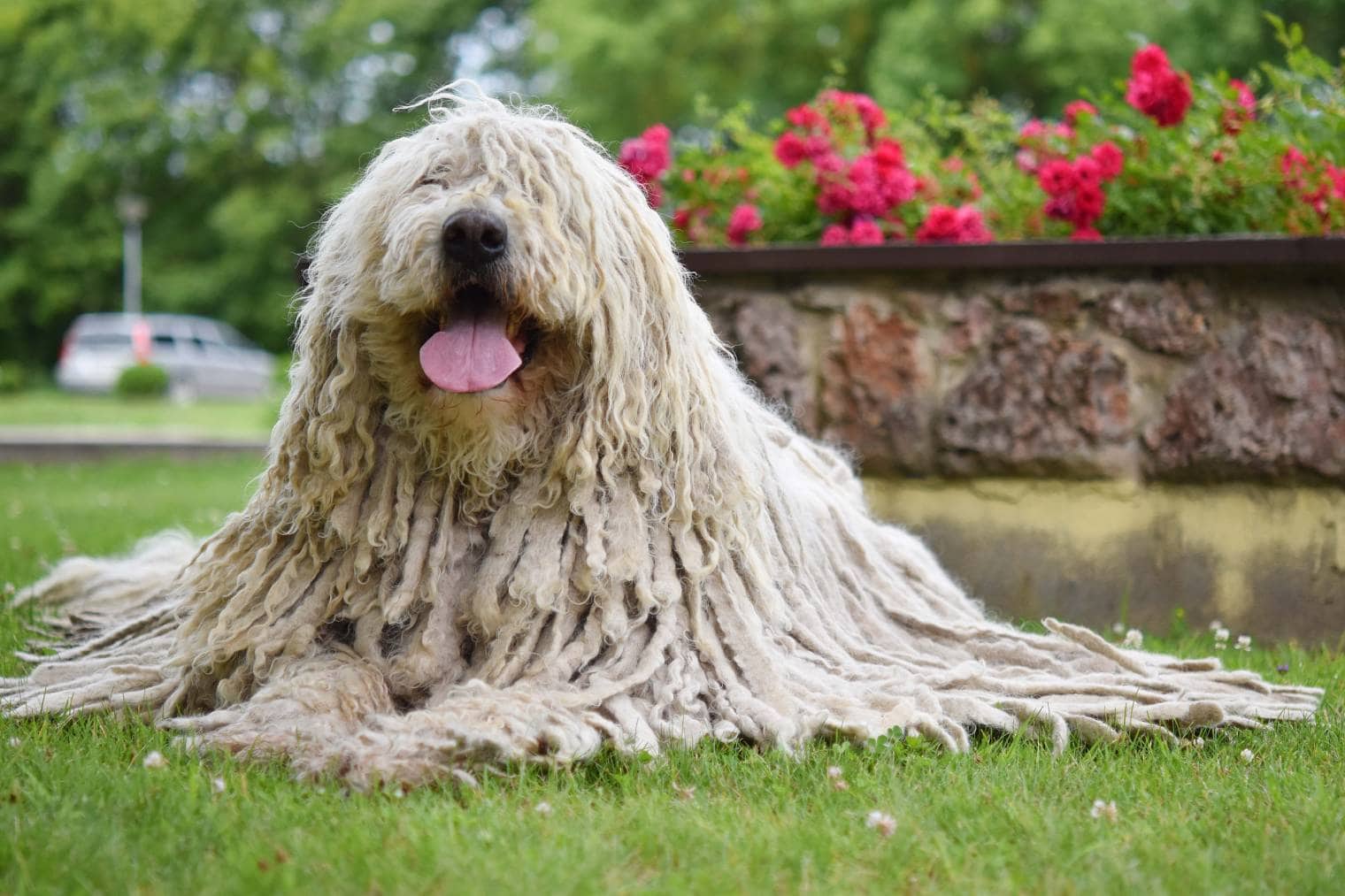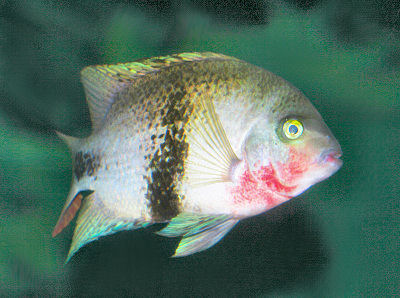Click Below to Skip Ahead
The American Pit Bull Terrier is recognized by the United Kennel Club (UKC) and the American Dog Breeders Association (ADBA). However, they are not registered with the American Kennel Club (AKC), which is the main kennel club in the United States.
The ancestors of the American Pit Bull came from the British Isles and likely included the Old English Bulldog and Old English Terrier. The short-haired dog falls toward the upper end of the medium-sized category. They are typically quite muscular, with smooth, short fur. They come in various colors, except merle, which is confined to only a few breeds.
Breed Overview
Height
17–21 inches
Weight
30–60 pounds
Lifespan
8–15 years
Colors
Everything but merle
Suitable for
Active families with kids of all ages
Temperament
People-pleasers Intelligent, Athletic
While the term “pit bull” is often used to describe many dogs, the American Pit Bull Terrier is the only true pit bull. Often, those in America use the term “pit bull” to describe the American Staffordshire Terrier, which is a completely different breed.
This breed is banned in some parts of the world due to “aggression.” However, they’re not more aggressive than most breeds and make excellent pets if trained and cared for properly. We’ll discuss the American Pit Bull Terriers in-depth below.
American Pit Bull Terrier Characteristics

American Pit Bull Terrier Puppies
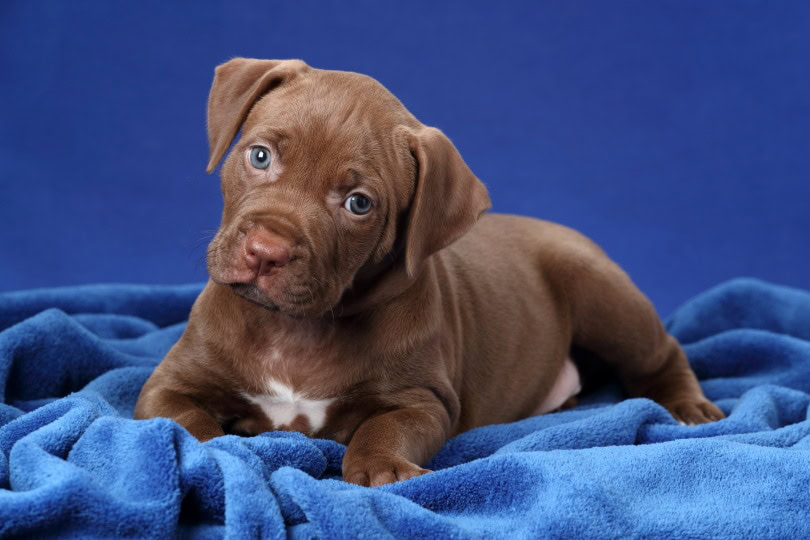
When purchasing an American Pit Bull Terrier, you must ensure that the dog isn’t another breed. Oftentimes, people will use the term “pit bull” to refer to other breeds as well and may market their puppies as such. Double-check that the puppies are American Pit Bull Terriers before you buy, or you could quickly end up with an American Staffordshire Terrier instead.
Although a reputable breeder can verify the dog’s origin and provide health records, adopting a Pit Bull Terrier from a shelter or rescue is more affordable. They have larger litters, which helps keep the price down somewhat. Show-quality dogs or those from proven bloodlines can cost a lot more. If you’re just looking for a pet, you don’t necessarily need to spend a higher amount of money on a puppy.
Show-quality dogs don’t necessarily make better pets than other dogs. They aren’t more expensive because they have better traits for families. Instead, they simply show physical characteristics that align with the breed standard, though the average owner likely won’t notice this.

Temperament & Intelligence of the American Pit Bull Terrier
American Pit Bull Terriers are confident and a bit excitable. They love people and will ask for plenty of attention. They are known to be good with children and are sometimes called “nurse dogs” for this reason. Their playful personality makes them great companions.
Pits are naturally athletic and excel at just about any athletic feat, including climbing. They are known for climbing over fences, which can make them somewhat challenging to contain. While they are sometimes seen in popular culture as aggressive canines, that isn’t the case. They’re more likely to happily greet an intruder than attempt to chase them away.
Aggression toward humans is undesirable in the breed and is quickly bred out by qualified breeders. This is another reason why it is essential to adopt from a good breeder. Backyard breeders don’t always know the genetics their dogs might carry, which can lead to somewhat aggressive dogs.
Pits are quite intelligent, which makes them easy to train, especially since they are people-pleasing canines. They are good at performing as well.
The American Pit Bull Terrier is somewhat controversial because of their perceived aggressiveness. Dog breed misidentification may play a significant role in the confusion. Dogs that aren’t American Pit Bull Terriers are often labeled as “pit bulls,” especially by the media after a biting incident. Even dogs at animal shelters do not reliably have their breed label.
Many studies have found that breed is not a good indicator of aggression, including one by the American Veterinary Medical Association.
Are These Dogs Good for Families?👪
Yes. American Pit Bull Terriers are excellent pets for families. They are gentle with children but also playful enough to keep most kids entertained. They require a bit of work, especially when it comes to exercising. For this reason, we only recommend them for active families or those with plenty of time for exercise.
They get along with people of all ages if they’re socialized and trained correctly.
Does This Breed Get Along With Other Pets?
American Pit Bull Terriers can get along with other pets if they grow up with them, but some don’t get along with dogs of the same sex. Socialization can help substantially, so we highly recommend puppy classes for this breed. Exposing them to several people and animals when they’re young can help them become well-behaved adults.
They are a bit excitable and have a decent prey drive. They love to chase things, which is often a problem for cats and other small animals. Again, early socialization can help but doesn’t necessarily guarantee that Pits will not be aggressive toward cats.
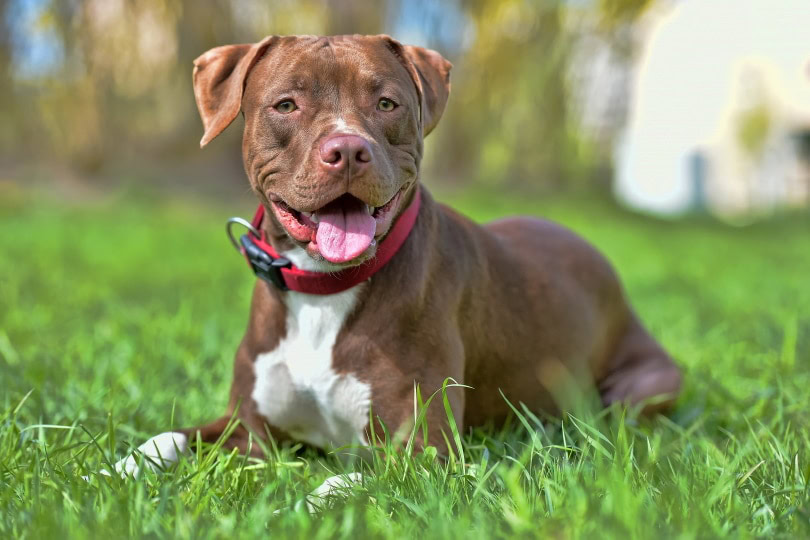

Things to Know When Owning an American Pit Bull Terrier
Food & Diet Requirements 🦴
Pit Bulls do not have any particular dietary needs. They aren’t prone to any health problems that are preventable with a specific diet either, so special dietary requirements typically aren’t required. Of course, follow your vet’s advice for your particular dog’s nutritional needs.
We recommend dog food that is full of meat and protein.
Exercise 🐕
The American Pit Bull Terrier is a working dog, which means that they were developed to do a specific job. Therefore, they have quite a bit of energy that they need to get rid of every day. They have high endurance and are well-known as high-energy dogs. They are true terriers and need plenty of exercise to remain happy and healthy.
They excel at just about everything physical. Walks are a suitable way to meet their energy needs, but they are also capable of playing more complicated games like hide-and-seek. They also excel at many canine sports, including agility, weight pulling, lure coursing, and flyball. Even if you don’t plan on competing, trying any of these sports is a great way to meet your dog’s mental and physical needs.
Training 🎾
The American Pit Bull Terrier is intelligent and eager to please, which makes them relatively easy to train. They are more than willing to listen to commands and comply. Many American Pit Bull Terriers have completed advanced obedience competitions and even won.
Their intelligence and physical skills have allowed them to be used as search and rescue dogs, police dogs, and service dogs.
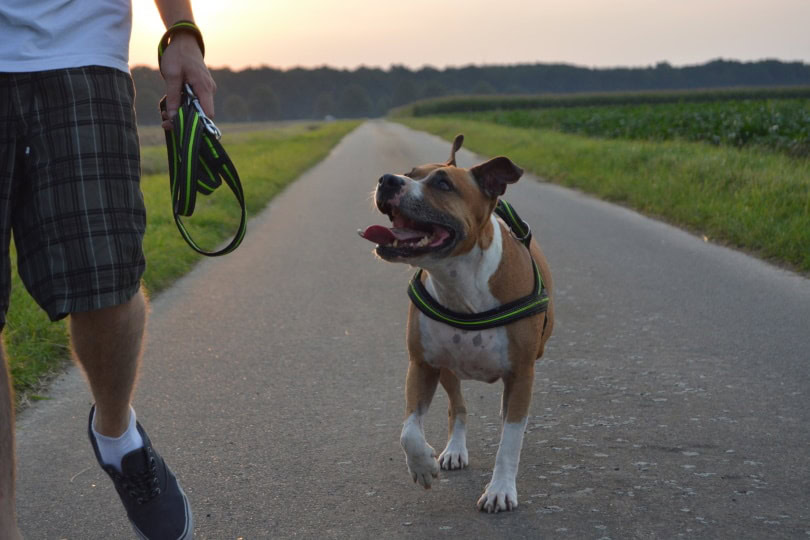
Grooming ✂️
The American Pit Bull Terrier does not require much grooming. Their short coat needs to be brushed weekly to remove excess hair and help keep it clean. Due to the shortness of their coat, they do not require trimming.
They have pretty good teeth and are not particularly prone to dental problems. However, regular brushing is vital to ensure they stay clean. We recommend brushing at least twice a week, though more often is better.
Their ears need to be cleaned regularly, even when they’re puppies. Check them whenever you brush their teeth to ensure that their ears are clean and free from debris. If they are dirty, clean them with a wet cotton ball.
Health and Conditions 🏥
Generally, the American Pit Bull Terrier is a healthy breed. As working dogs, they were bred for practicality, not necessarily for looks. Today, they are kept mostly as family dogs. Despite their overall healthy outlook, they are more prone to hip dysplasia.
It is a serious condition that affects the joints in the hips. Basically, the joints do not fit together correctly, which causes wear and tear. Over time, this can cause extreme pain for the dogs and lead to lameness.
Once, they were also very prone to patella problems, thyroid dysfunction, and congenital heart defects. However, careful breeding over time has led to a decrease in these conditions. Today, they are not particularly prone to them over other canines.
If not vaccinated, the Pit Bull is more prone to parvovirus. For this reason, it is essential to vaccinate them as puppies and to continue with their vaccination schedule until they are much older. They are also more prone to Demodex mange, which can be localized or generalized. While this is not a particularly contagious version of mange, it can be challenging to treat.
Generalized Demodex is more serious and can cause severe sickness. The signs include hair loss throughout the body, which may cause the skin to become scabbed and bloody. Usually, generalized diseases are caused by immunodeficiency in the dog, which puts them at risk.

Male vs Female
Male American Pit Bull Terriers are typically larger than females. However, that is the only significant difference between the sexes.


3 Little-Known Facts About the American Pit Bull Terrier
1. The Term “Pit Bull” Refers to Several Dogs.
The use of the phrase “pit bull” is a bit confusing. It can refer to the American Pit Bull Terrier, the group of breeds known as pit bull-like dogs, or a separate breed altogether. Many people label the American Staffordshire Terrier as a pit bull, even though it technically isn’t. Be careful when purchasing and researching this breed, as you may end up with a different breed altogether.
2. They Are Known as “Nanny Dogs.”
American Pit Bull Terriers are gentle and understanding with children. They make great family dogs for this reason.
3. They Were Originally Used for “Bull-Baiting.”
This sport involved the canine fighting bulls and bears, which were often tied up to posts. In the 1800s, the sport became illegal in England. The dogs were still often used in illegal dog fights, though many transitioned to being family pets. Due to their purpose as largely a family dog over the last 200 years, much of their aggression has been bred out.
- Next on your reading list: Pitbull Ear Cropping: Why Is It Done and Is It Cruel?
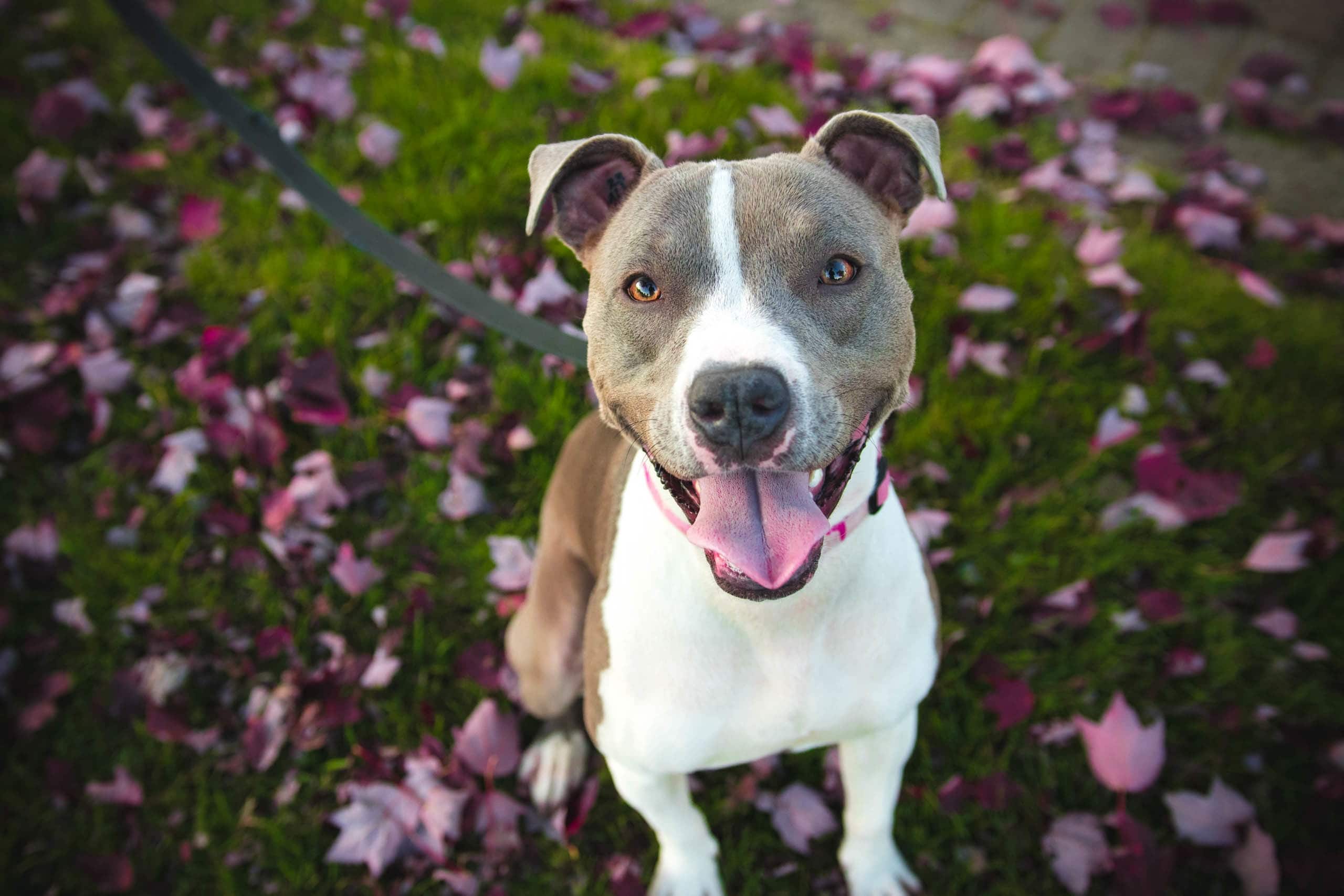

Final Thoughts
The American Pit Bull Terrier often has an unnecessary reputation for being aggressive. However, they are not much more aggressive than any other canine. They are friendly, loyal, responsive to training, and make great family pets.
They’re also incredibly athletic and can compete in canine sports, including agility and weight pulling. As intelligent people-pleasers, they are also relatively easy to train. They can successfully compete in advanced obedience training and have no problem listening to commands when asked.
If you can meet this high-energy dog’s exercise needs, they make good companions, despite their reputation.
See also:
- Worst Dog Breeds for Cats
- National Pitbull Awareness Month: When It Is & How to Celebrate
- How Long Will My Pit Bull Be Pregnant? Vet Reviewed Facts & FAQ
Featured Image Credit: David Robert Perez, Shutterstock
